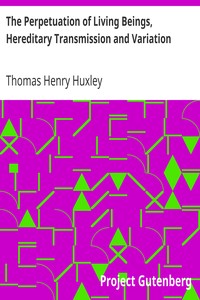| Author |
Huxley, Thomas Henry, 1825-1895 |
| Title |
The Perpetuation of Living Beings, Hereditary Transmission and Variation
Lecture IV. (of VI.), "Lectures to Working Men", at the Museum of Practical Geology, 1863, on Darwin's Work: "Origin of Species"
|
| Credits |
Produced by Amy E. Zelmer, and David Widger
|
| Summary |
"The Perpetuation of Living Beings, Hereditary Transmission and Variation" by Thomas Henry Huxley is a scientific publication written in the late 19th century. The book explores the complex phenomena of reproduction, heredity, and variation in living organisms, delving into both asexual and sexual modes of perpetuation. It aims to understand how living beings pass on their traits and how variations arise within species. In this work, Huxley discusses the two primary modes of reproduction: asexual, where organisms reproduce without the involvement of specialized sexes, and sexual, which involves the combination of male and female gametes. He illustrates how offspring generally inherit traits from their parents, a phenomenon he refers to as "atavism," while also emphasizing the role of variation and the influence of external conditions on genetic change. Through various examples, including the breeding of domestic animals and specific cases of spontaneous variation, Huxley demonstrates how both heredity and environmental factors contribute to the diversity of forms in the natural world, thereby laying foundational ideas for understanding evolution and the continuity of life. (This is an automatically generated summary.)
|
| Language |
English |
| LoC Class |
QH: Science: Natural history
|
| Subject |
Evolution (Biology)
|
| Subject |
Darwin, Charles, 1809-1882. On the origin of species
|
| Category |
Text |
| EBook-No. |
2924 |
| Release Date |
Nov 1, 2001 |
| Most Recently Updated |
Jan 22, 2013 |
| Copyright Status |
Public domain in the USA. |
| Downloads |
94 downloads in the last 30 days. |
|
Project Gutenberg eBooks are always free!
|

